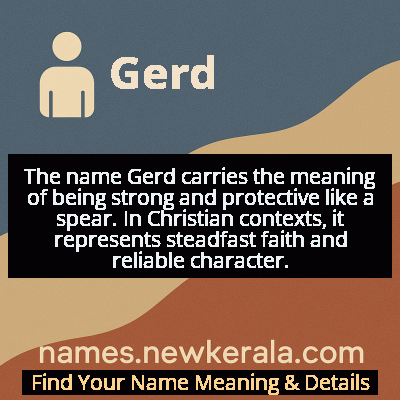Gerd Name Meaning & Details
Origin, Popularity, Numerology Analysis & Name Meaning of Gerd
Discover the origin, meaning, and cultural significance of the name GERD. Delve into its historical roots and explore the lasting impact it has had on communities and traditions.
Name
Gerd
Gender
Male
Origin
Christian
Lucky Number
7
Meaning of the Name - Gerd
The name Gerd carries the meaning of being strong and protective like a spear. In Christian contexts, it represents steadfast faith and reliable character.
Gerd - Complete Numerology Analysis
Your Numerology Number
Based on Pythagorean Numerology System
Ruling Planet
Neptune (Ketu)
Positive Nature
Intuitive, analytical, spiritual, and inquisitive.
Negative Traits
Secretive, reserved, aloof, and can be overly critical.
Lucky Colours
Green, yellow.
Lucky Days
Monday.
Lucky Stones
Cat’s eye, moonstone.
Harmony Numbers
1, 5, 6.
Best Suited Professions
Scientists, researchers, spiritual leaders, detectives.
What People Like About You
Depth of knowledge, analytical skills, spirituality.
Famous People Named Gerd
Gerd Müller
Footballer
Legendary German striker, World Cup winner, and one of football's greatest goalscorers
Gerd Binnig
Physicist
Nobel Prize winner for co-inventing the scanning tunneling microscope
Gerd von Rundstedt
Military Commander
Prominent German field marshal during World War II
Gerd Leukefeld
Astronomer
Discoverer of numerous asteroids and comets
Name Variations & International Equivalents
Click on blue names to explore their detailed meanings. Gray names with will be available soon.
Cultural & Historical Significance
Extended Personality Analysis
People named Gerd are commonly associated with characteristics of strength, reliability, and practical wisdom. The name's etymology suggests someone who is both mentally and physically resilient—able to withstand challenges while maintaining clear direction toward their goals. Typically, Gerds are perceived as grounded individuals who value tradition and stability, often serving as anchors in their families and communities. They tend to be methodical problem-solvers rather than impulsive actors, approaching difficulties with the same focused determination implied by their name's 'spear' symbolism. Their strength is usually balanced with a sense of responsibility and loyalty, making them trusted friends and colleagues. While they may not seek the spotlight, they often emerge as natural leaders in crises due to their calm demeanor and reliable judgment. The 'hard' component of their name suggests not rigidity but rather endurance—the ability to persist through challenges without breaking. This combination creates a personality profile of someone who is both protective and productive, using their inner strength to support others while achieving personal objectives.
Modern Usage & Popularity
In contemporary naming practices, Gerd has experienced a significant decline in popularity, particularly since the late 20th century. While it remains recognizable in German-speaking countries and Scandinavia, it is now primarily associated with older generations and is rarely given to newborns. Current naming trends favor either the full form Gerhard or completely modern alternatives, leaving Gerd with a somewhat dated perception. The name's strongest presence today is in Germany and Austria, where it maintains cultural recognition but minimal usage statistics. Among immigrant communities from these regions, the name sometimes appears as a nod to heritage, though even here it's becoming increasingly rare. The decline reflects broader shifts away from traditional Germanic short forms toward international or newly created names. However, the name retains a certain nostalgic appeal and occasionally appears in artistic or literary contexts as representing traditional values and strength of character.
Symbolic & Spiritual Meanings
The name Gerd carries rich symbolic meaning derived from its etymological components of 'spear' and 'hard.' Symbolically, the spear represents focused direction, penetration through obstacles, and protective authority—it's both an instrument of action and a symbol of guardianship. The 'hard' element symbolizes resilience, endurance, and unyielding strength in the face of adversity. Together, these create a powerful metaphor for someone who can both initiate change and withstand pressure, combining proactive and defensive capabilities. In psychological terms, the name suggests integrity and steadfastness—the ability to maintain one's course despite external pressures. The spear also carries phallic symbolism, connecting to traditional concepts of masculinity and generative power, while the hardness suggests moral fortitude and reliability. In modern interpretation, these symbols translate to qualities of determination, protection of loved ones, and the ability to 'cut through' complexity to find practical solutions. The name thus represents balanced strength—both the power to act and the resilience to endure.

